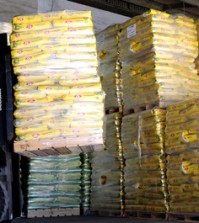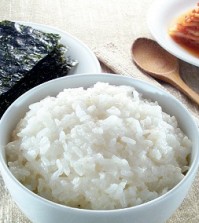- California Assembly OKs highest minimum wage in nation
- S. Korea unveils first graphic cigarette warnings
- US joins with South Korea, Japan in bid to deter North Korea
- LPGA golfer Chun In-gee finally back in action
- S. Korea won’t be top seed in final World Cup qualification round
- US men’s soccer misses 2nd straight Olympics
- US back on track in qualifying with 4-0 win over Guatemala
- High-intensity workout injuries spawn cottage industry
- CDC expands range of Zika mosquitoes into parts of Northeast
- Who knew? ‘The Walking Dead’ is helping families connect
South Korea faces ‘oversupply’ of rice
Due to increases in imports and production amid a steady decline in consumption
(Yonhap) Korea may face a possible oversupply of rice this year due to an increase in imports and its own production amid a steady decline in the country’s overall rice consumption, the government said Tuesday, with the local rice market opening having yet to be decided.
The Ministry of Agriculture, Food and Rural Affairs has said the country’s self-sufficiency rate for rice is expected to reach 92 percent this year, breaching the 90-percent mark for the first time in four years.
However, the country’s rice imports under a minimum market access (MMA) quota are also expected to grow to 409,000 tons, accounting for about 9 percent of Korea’s total estimated consumption.
The country’s rice import quota has been growing steadily since 1993 when the country was allowed to postpone opening its rice market under an agreement with the World Trade Organization (WTO).
The agreement, extended by 10 years in 2004 in exchange for further increases in the MMA quota, expires at the end of this year.
Ministry officials said the government has yet to make a final decision on whether to liberalize the country’s rice market though many have noted the country may have no other option.
The Philippines, the only other country in the world that has yet to liberalize its rice market, recently failed to negotiate another extension of its agreement with the WTO despite its offer to more than double its mandatory rice imports to over 800,000 tons.
Kim Kyung-mee, head of the ministry’s agricultural commerce division, has noted Korea, Asia’s fourth-largest economy, may be asked to give much more than what the Philippines had offered to win another delay of its market opening.
Once increased, rice import quotas under the MMA remain fixed even after a country liberalizes its market, meaning Korea already has to import over 400,000 tons of rice every year even if it decides to open its market immediately.
Such a large amount in imports may force the country to cut back on its own harvest as the country’s rice consumption is declining steadily.
The country’s overall rice consumption is expected to reach 4.58 million tons this year with its per capita consumption expected to shrink 1.75 percent on-year to 67.3 kilograms, according to the ministry.
“If the country decides to seek another waiver for its market opening, which will result in a large increase in its import quota, the country will have no choice but to significantly reduce its own rice production to avoid an oversupply,” a ministry official said, while speaking on condition of anonymity.
The ministry has said it will make its final decision on the rice market opening before the end of June. The first public hearing on the issue is scheduled for next week.















